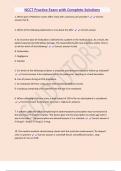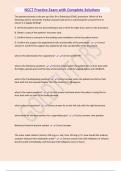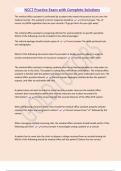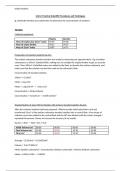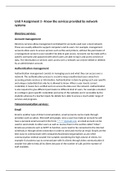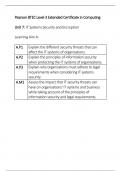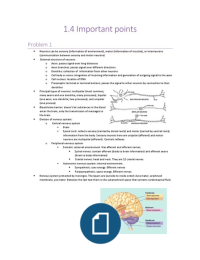Trusts – LC2: Constituting the Trust
1. Constituting trusts and perfecting gifts: introduction and context
Video
Creating a trust – the settlor transfers the property to the trustee who holds the property for
the beneficiary or declares himself trustee for the benefit of the beneficiary.
What is needed for a valid trust?
1. Must comply with the three certainties intention; subject; object,
2. Must satisfy any specific formalities trusts of land; testamentary trust,
3. Must not offend the perpetuity rule property must vest individuals within a certain
period of time,
4. The trust property must be held by the trustee the trust must be fully constituted.
The legal title must be in the hands of the trustee for it to be fully constituted!
What is the problem with the constitution of trusts?
When we’re looking at a self-declaration trust, there simply is not a problem, because
obviously the title of the property is already theirs, they simply now hold it in a different
capacity as trustee.
Difficulty arises when the settlor has asked somebody else to act as the trustee because
that means that the property needs to be transferred from the settlor to the trustee. What
happens if something goes wrong with that transfer? The trustee is not holding anything, but
of course the settlor and the trustee intended that they should be holding the property on trust,
and it may well be that the beneficiary is aware of this as well. Should equity step in to
uphold the trust?
Equity cannot change the legal position; it cannot step in and simply say that the transfer is
valid. What it can do is to step in and say that the trust is effective in equity. This means that
the settlor would still have the legal title, because the transfer has gone wrong. The settlor
will hold on trust for the trustee, so the trustee will have the equitable title.
Often where a transfer has in some way gone wrong, it is actually not a huge problem
because the transferor/settlor/donor will simply go back and does it again. But what if they
change their mind, or what if they died? There are circumstances where it is not possible to
put things right.
What will equity do? – equity is rather reluctant to step in and help in these scenarios.
The starting point is the two maxims:
(1) Equity will not assist a volunteer (volunteer = beneficiary or donee in the case of a
gift),
(2) Equity will not perfect an imperfect gift (or an imperfectly constituted trust).
Equity requires legal title to have been transferred and only then will it enforce the rights
of the beneficiary.
If equity is not prepared to step in and help as a general rule, why is that?
It is not really clear: Arden LJ in Pennington v Waine talks about protecting the right of
the donor to change their minds in making a gift to a volunteer. She talks about safeguarding
position of the donor. She also talks about the need for a clearly ascertainable point in time in
which the gift was completed.
1
,Trusts – LC2: Constituting the Trust
We can see the strict approach in operation in Milroy v Lord – S sought to transfer shares to T
on trust for B but used incorrect method of legal transfer. It was held that the trust was not
constituted as legal title not in hands of T; S remained absolute owner of the shares. Could
neither compel the completion of the transfer to T, nor treat S as holding shares on trust for B.
Turner LJ: “In order to render a voluntary settlement valid and effectual, the settlor must
have done everything which, according to the nature of the property, comprised in the
settlement, was necessary to be done in order to transfer the property and render the
settlement binding…”
This is absolutely clear.
Outlines the three ways in which property can be dealt with:
(1) Actually transferring the property = a gift,
(2) Transferring the property to a trustee for them to hold on trust for someone else,
(3) Self-declaration where the settlor declares themselves as holding on trust.
BUT he is very clear on the fact that in order to render the settlement binding, one or other of
these modes must be resorted to. There is no equity in this court to perfect an imperfect gift.
If a settlement is intended to be affected by one of the modes, the court will not give effect to
it by applying another one of these modes.
e.g. if you intend a gift and something goes wrong, the court will not step in by imposing a
trust Milroy v Lord = follows the maxim ‘equity will not perfect an imperfect gift’
Another case where maxims are being enforced is Jones v Lock – J sought to give cheque
(payable to self) to baby son; placed in hands, and then in safe. Transfer was ineffective as
the cheque was not endorsed. J then died. It was held that the title had not passed so the gift
had failed; J remained owner at his death. Gift was thus ineffective and could not be treated
as declaration of trust as this was not J’s intention.
Lord Cranworth LC: “The question in each case is one of fact; has there been a gift or not,
or has there been a declaration of trust or not?”
There has not been a gift because the cheque was not endorsed,
No declaration of trust because it was never J’s intention.
= follows the maxims.
Further examples:
Richards v Delbridge: Purported, ineffective gift of leasehold property could not be
construed as a declaration of trust.
Re Fry: Purported gift of shares ineffective because Treasury consent required but not
obtained before the donor died.
When looked at the judgements from these cases, there seems to be a fairly clear theme of
regret on the part of judges involved, that they could not do more to help the situation. But
they were clear that they were bound by the maxims ‘equity will not perfect an imperfect
gift’, and ‘equity will not assist a volunteer’.
On the other hand ‘equity will not strive officiously to defeat a gift’, Choithram International
SA v Pagarani: P intended to leave wealth to charitable foundation, of which he was one of
the trustees. Declared orally that he gave all his estate to the foundation. P died, before he had
transferred the assets to trustees of foundation.
The court asked:
(1) Was there an intended gift? Or was there a declaration of trust?
2
, Trusts – LC2: Constituting the Trust
(2) If there were a trust, was it effective given the failure to vest the property in the
trustees, of who himself was one.
Lord Browne-Wilkinson: “Although equity will not aid a volunteer, it will not strike
officiously to defeat a gift.” = attempt to take a more generous interpretation as the facts
allow.
The judgement made clear that the transfer could not be construed as a gift because
the foundation itself has no legal personality. Any gift to the foundation could only
mean a gift to the trustees on trust for the foundation.
The court then asked:
(3) Was the creation of trust properly constituted? Because the money had not been
transferred to the foundation trustee, although, of course, he himself was one of
them.
The court was of the view that as he himself was a trustee, and of course, as far as he
himself was concerned as a trustee, it was self-declaration, although for other trustees
there needed to be a transfer.
Because of this element of self-declaration that he could not deny the trust. All
involved were bound by the trust, and the money was to be transferred into the name
of the remaining trustees.
This meant that his family did not get the money, but the charitable foundation did.
Will equity assist a volunteer?
Starting point for this: ‘equity will not assist a volunteer’ / ‘equity will noy perfect an
imperfect gift’ e.g. Milroy v Lord; Jones v Lock
Where things have not been done properly in terms of the transfer, the donor/settlor remains
the absolute owner.
But we have seen in Choithram that the court ‘will not strive officiously to defeat a gift’. The
court may read the facts of the case more generously.
There are some circumstances in which equity does appear to help a volunteer either by
intervening or by determining that the gift/transfer is actually complete, despite first
appearances.
Virgo, pp.135-139
(A) General principles for constitution of trusts:
(1) The nature of constituting a trust
The process of vesting of title = ‘constituting’ the trust.
Requirements: depend on the circumstances in which the trust is declared and the nature of
the property that is intended to be held on trust.
(2) Timing
The declaration of trust and its constitution need not be contemporaneous = the settlor can
declare the trust one day and legal title to property can be transferred to the trustee much
later.
3
1. Constituting trusts and perfecting gifts: introduction and context
Video
Creating a trust – the settlor transfers the property to the trustee who holds the property for
the beneficiary or declares himself trustee for the benefit of the beneficiary.
What is needed for a valid trust?
1. Must comply with the three certainties intention; subject; object,
2. Must satisfy any specific formalities trusts of land; testamentary trust,
3. Must not offend the perpetuity rule property must vest individuals within a certain
period of time,
4. The trust property must be held by the trustee the trust must be fully constituted.
The legal title must be in the hands of the trustee for it to be fully constituted!
What is the problem with the constitution of trusts?
When we’re looking at a self-declaration trust, there simply is not a problem, because
obviously the title of the property is already theirs, they simply now hold it in a different
capacity as trustee.
Difficulty arises when the settlor has asked somebody else to act as the trustee because
that means that the property needs to be transferred from the settlor to the trustee. What
happens if something goes wrong with that transfer? The trustee is not holding anything, but
of course the settlor and the trustee intended that they should be holding the property on trust,
and it may well be that the beneficiary is aware of this as well. Should equity step in to
uphold the trust?
Equity cannot change the legal position; it cannot step in and simply say that the transfer is
valid. What it can do is to step in and say that the trust is effective in equity. This means that
the settlor would still have the legal title, because the transfer has gone wrong. The settlor
will hold on trust for the trustee, so the trustee will have the equitable title.
Often where a transfer has in some way gone wrong, it is actually not a huge problem
because the transferor/settlor/donor will simply go back and does it again. But what if they
change their mind, or what if they died? There are circumstances where it is not possible to
put things right.
What will equity do? – equity is rather reluctant to step in and help in these scenarios.
The starting point is the two maxims:
(1) Equity will not assist a volunteer (volunteer = beneficiary or donee in the case of a
gift),
(2) Equity will not perfect an imperfect gift (or an imperfectly constituted trust).
Equity requires legal title to have been transferred and only then will it enforce the rights
of the beneficiary.
If equity is not prepared to step in and help as a general rule, why is that?
It is not really clear: Arden LJ in Pennington v Waine talks about protecting the right of
the donor to change their minds in making a gift to a volunteer. She talks about safeguarding
position of the donor. She also talks about the need for a clearly ascertainable point in time in
which the gift was completed.
1
,Trusts – LC2: Constituting the Trust
We can see the strict approach in operation in Milroy v Lord – S sought to transfer shares to T
on trust for B but used incorrect method of legal transfer. It was held that the trust was not
constituted as legal title not in hands of T; S remained absolute owner of the shares. Could
neither compel the completion of the transfer to T, nor treat S as holding shares on trust for B.
Turner LJ: “In order to render a voluntary settlement valid and effectual, the settlor must
have done everything which, according to the nature of the property, comprised in the
settlement, was necessary to be done in order to transfer the property and render the
settlement binding…”
This is absolutely clear.
Outlines the three ways in which property can be dealt with:
(1) Actually transferring the property = a gift,
(2) Transferring the property to a trustee for them to hold on trust for someone else,
(3) Self-declaration where the settlor declares themselves as holding on trust.
BUT he is very clear on the fact that in order to render the settlement binding, one or other of
these modes must be resorted to. There is no equity in this court to perfect an imperfect gift.
If a settlement is intended to be affected by one of the modes, the court will not give effect to
it by applying another one of these modes.
e.g. if you intend a gift and something goes wrong, the court will not step in by imposing a
trust Milroy v Lord = follows the maxim ‘equity will not perfect an imperfect gift’
Another case where maxims are being enforced is Jones v Lock – J sought to give cheque
(payable to self) to baby son; placed in hands, and then in safe. Transfer was ineffective as
the cheque was not endorsed. J then died. It was held that the title had not passed so the gift
had failed; J remained owner at his death. Gift was thus ineffective and could not be treated
as declaration of trust as this was not J’s intention.
Lord Cranworth LC: “The question in each case is one of fact; has there been a gift or not,
or has there been a declaration of trust or not?”
There has not been a gift because the cheque was not endorsed,
No declaration of trust because it was never J’s intention.
= follows the maxims.
Further examples:
Richards v Delbridge: Purported, ineffective gift of leasehold property could not be
construed as a declaration of trust.
Re Fry: Purported gift of shares ineffective because Treasury consent required but not
obtained before the donor died.
When looked at the judgements from these cases, there seems to be a fairly clear theme of
regret on the part of judges involved, that they could not do more to help the situation. But
they were clear that they were bound by the maxims ‘equity will not perfect an imperfect
gift’, and ‘equity will not assist a volunteer’.
On the other hand ‘equity will not strive officiously to defeat a gift’, Choithram International
SA v Pagarani: P intended to leave wealth to charitable foundation, of which he was one of
the trustees. Declared orally that he gave all his estate to the foundation. P died, before he had
transferred the assets to trustees of foundation.
The court asked:
(1) Was there an intended gift? Or was there a declaration of trust?
2
, Trusts – LC2: Constituting the Trust
(2) If there were a trust, was it effective given the failure to vest the property in the
trustees, of who himself was one.
Lord Browne-Wilkinson: “Although equity will not aid a volunteer, it will not strike
officiously to defeat a gift.” = attempt to take a more generous interpretation as the facts
allow.
The judgement made clear that the transfer could not be construed as a gift because
the foundation itself has no legal personality. Any gift to the foundation could only
mean a gift to the trustees on trust for the foundation.
The court then asked:
(3) Was the creation of trust properly constituted? Because the money had not been
transferred to the foundation trustee, although, of course, he himself was one of
them.
The court was of the view that as he himself was a trustee, and of course, as far as he
himself was concerned as a trustee, it was self-declaration, although for other trustees
there needed to be a transfer.
Because of this element of self-declaration that he could not deny the trust. All
involved were bound by the trust, and the money was to be transferred into the name
of the remaining trustees.
This meant that his family did not get the money, but the charitable foundation did.
Will equity assist a volunteer?
Starting point for this: ‘equity will not assist a volunteer’ / ‘equity will noy perfect an
imperfect gift’ e.g. Milroy v Lord; Jones v Lock
Where things have not been done properly in terms of the transfer, the donor/settlor remains
the absolute owner.
But we have seen in Choithram that the court ‘will not strive officiously to defeat a gift’. The
court may read the facts of the case more generously.
There are some circumstances in which equity does appear to help a volunteer either by
intervening or by determining that the gift/transfer is actually complete, despite first
appearances.
Virgo, pp.135-139
(A) General principles for constitution of trusts:
(1) The nature of constituting a trust
The process of vesting of title = ‘constituting’ the trust.
Requirements: depend on the circumstances in which the trust is declared and the nature of
the property that is intended to be held on trust.
(2) Timing
The declaration of trust and its constitution need not be contemporaneous = the settlor can
declare the trust one day and legal title to property can be transferred to the trustee much
later.
3


